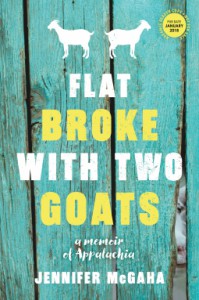Murder by Death
I read cozy and historical mysteries, a bit of Paranormal/UF, and to mix it up, I read science and gardening books on occasion.
Flat Broke with Two Goats

This book arrived and I showed it to MT and said "look! our retirement plan arrived!" (referring to the goat part, not the broke part. I hope.)
When I first saw this title I was immediately drawn to it because I wanted to hear from people who'd done what we sometimes talk about doing: leaving urbanity behind for a quieter, more sustainable and slower paced life. Preferably surrounded by a mix of domesticated animals and nonvenomous wildlife.
But this book ended up being more complicated than that and my review is going to sound a tad ungenerous because of it. Ungenerous because the complicated bits are well written, and at times riveting, but not what I was looking for. Look at that title and cover; that cover and title imply a certain level of quirky adventure and maybe a humorous mishap or two while journeying the learning curve of homesteading.
Instead, this is primarily the story of the author and her husband's experience with the Global Financial Crisis and the consequences of living on credit, written by a woman who sounds like she's still very much on the road to emotional recovery. McGaha's husband - an accountant - didn't pay their personal state or federal income taxes for four years. By the time she finds out, the IRS and the state have put liens on everything, seized their bank accounts and garnished their wages. With no choices left, they walked away from their home, and took up residence in an ancient cabin in the North Carolina woods that distant relatives of her husband offered them for a peppercorn rent. So less quirky and fun than the marketing department would lead you to believe.
The first third of the book covers this downward spiral and it is a cautionary tale and almost the cliche for a great many living in the 1990's. McGaha doesn't pull any punches about her anger at herself and her husband, nor how bad things got between them. There's also a horrific but ultimately irrelevant chapter about her brief but terrifying first marriage, told as a flashback. It's gripping stuff but it honestly has no relevance at all to the rest of the book, especially as we never find out what happened to him, or his relationship with their daughter, if any.
The remainder of the book focuses on their experiences at the cabin; cleaning it up, trying to cope with the transition from city water and sewer to spring fed water tanks and wood burning boilers. Their encounters with local wildlife of both the venomous and rodent variety, and their first forays into keeping chickens and goats. Interspersed throughout are flashbacks to her grandparents and ... I don't know what to call them ... daydreams? about her great-grandparents and their connection to the land in Appalachia.
Again, these 'memoirs' are really well written, but this reader bought a book about being broke and raising goats, not about dreams of the author's Appalachian ancestors. And while I DID get the stuff about the goats and chickens, I'd have liked more detail; I wanted to know more about the cabin, the chickens, the structures they built; I got a lot about the goats, but the cheese making was brief, as was the soap making. I can't help but think if there'd been fewer memories, maybe I'd have gotten more of the pertinent details.
Even though I think there are really two books here - the story of their recovery and altered lifestyle, and a collection of stories/memories/dreams about her ancestors - it is still an incredibly eye-opening, informative read. So much so that I handed it to MT when I finished and told him to read it, but that he should feel free to skip the disjointed bits.
 2
2
 4
4



